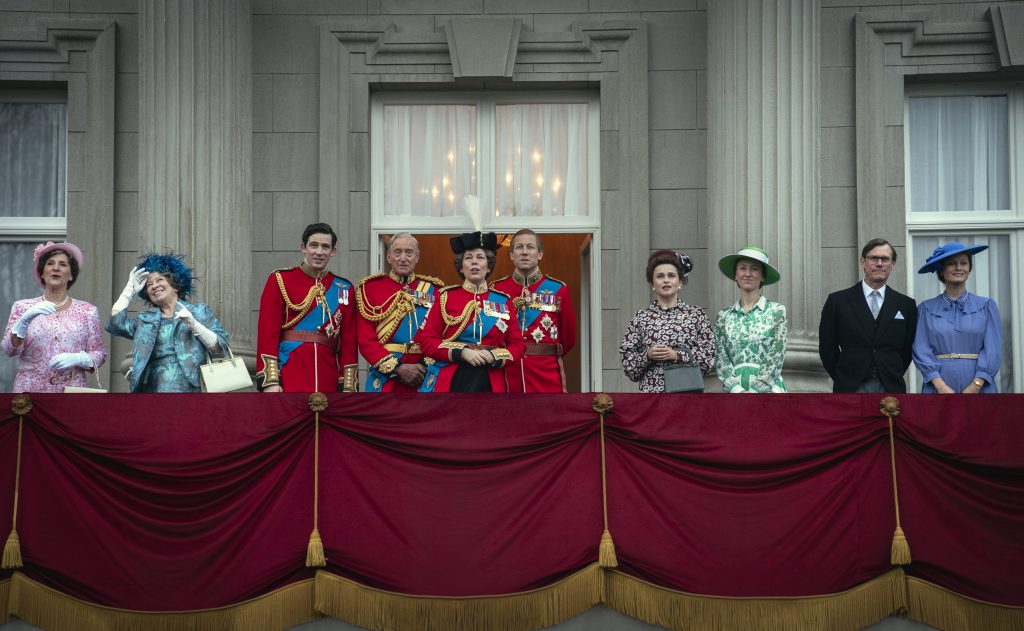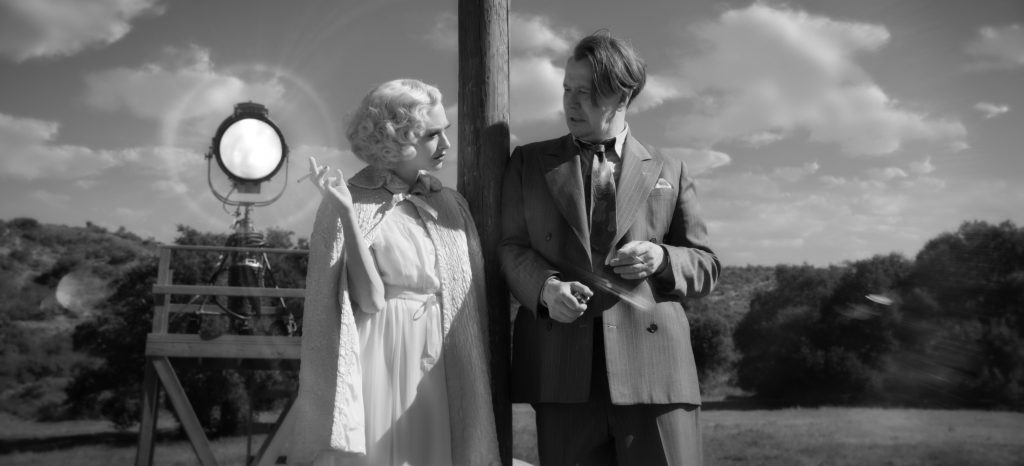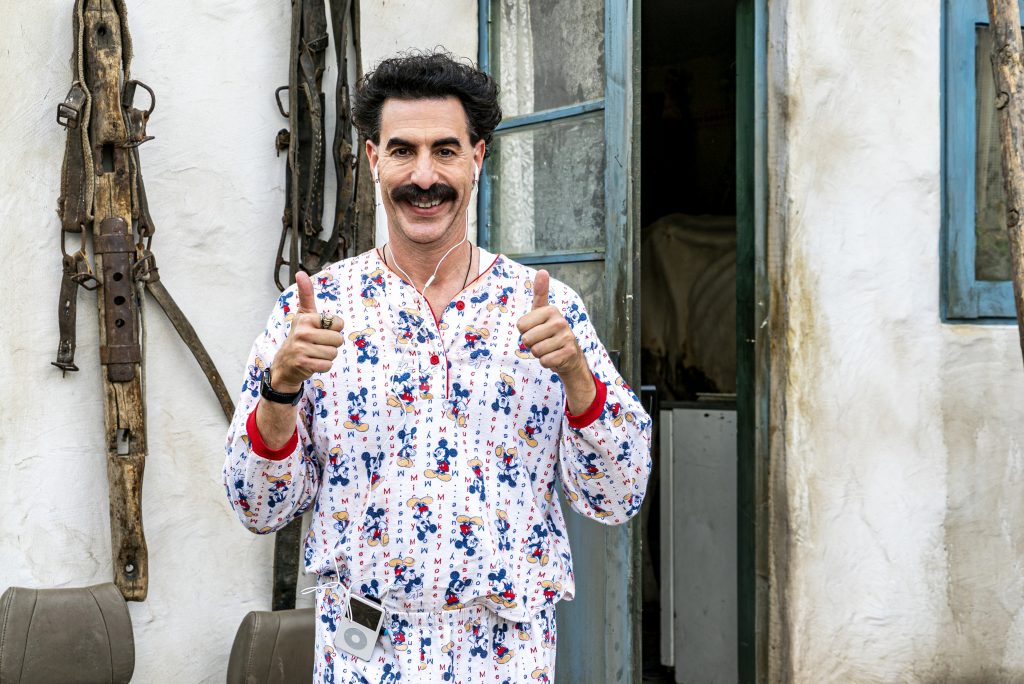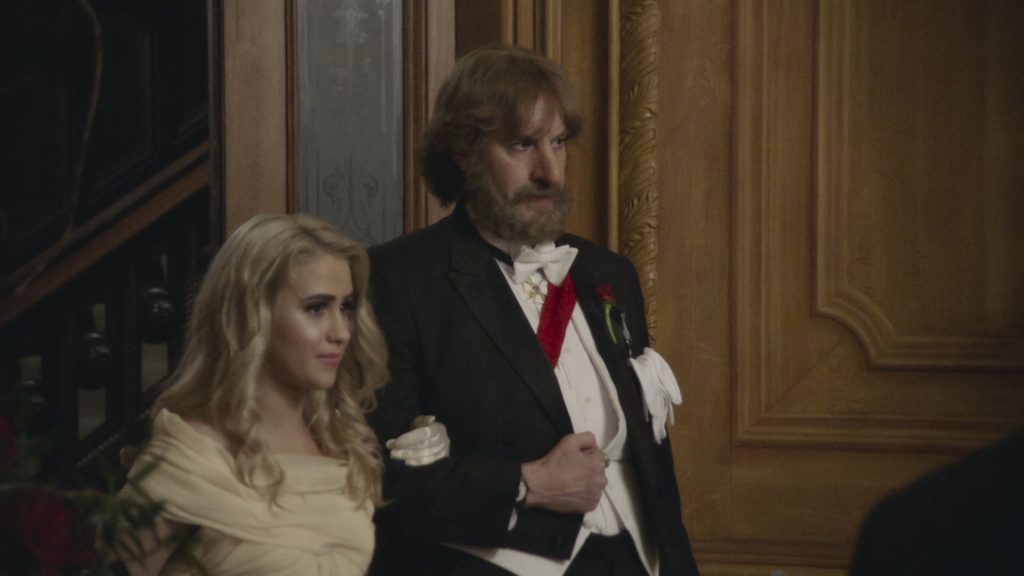February 28, 2021
by Carla Hay

With four prizes, Netflix’s drama series “The Crown” was the top winner at the 78th Annual Golden Globe Awards, which were presented on February 28, 2021. “The Crown” won the award for Best Television Series – Drama. The movie’s other prizes went to Josh Connor, for Best Actor in a Television Series – Drama; Emma Corrin, for Best Actress in a Television Series – Drama; and Gillian Anderson, for Best Supporting Actress in a Series, Limited Series or Motion Picture Made for Television.
There was no one movie that dominated at the 2021 Golden Globe Awards. Searchlight Pictures’ “Nomadland,” Amazon Studios’ “Borat Subsequent Moviefilm” and Pixar Animation Studios’ “Soul” won two awards each. “Nomadland” won the prize for Best Motion Picture – Drama. “Nomadland” director Chloé Zhao made Golden Globes history by becoming the first woman of color to win a Golden Globe for Best Director. She is also the second woman to win this prize, after Barbra Streisand won for 1983’s “Yentyl.” “Borat Subsequent Moviefilm” took the prizes for Best Motion Picture – Musical or Comedy, while the movie’s star Sacha Baron Cohen won the prize for Best Actor in a Motion Picture – Musical or Comedy. “Soul” won the awards for Best Animated Film and Best Original Score.
The Golden Globes ceremony has traditionally been held at the Beverly Hilton Hotel in Beverly Hills, California. However, due to the COVID-19 pandemic, there was no large, in-person gathering at the ceremony. Instead, the Golden Globes ceremony had video linkups of the nominees, so that when the winners are announced, the winners could react live with their acceptance speeches. Tina Fey and Amy Poehler hosted the ceremony, with Fey Rainbow Room in New York City and Poehler at the Beverly Hilton. NBC had the U.S. telecast of the show.
Netflix’s dramatic movie “Mank” went into the ceremony with the most nominations (six), but in the end, didn’t win any Golden Globes. “Mank” is director David Fincher’s movie about screenwriter Herman J. Mankiewicz (nicknamed Mank) and his experiences while he co-wrote the 1941 classic “Citizen Kane,” including his clashes with “Citizen Kane” director Orson Welles.
The most emotional moment of the night was for the late Chadwick Boseman, who was awarded the prize of Best Actor in a Motion Picture – Drama, for his final acting role in Netflix’s “Ma Rainey’s Black Bottom.” Boseman’s widow Taylor Simone Ledward-Boseman tearfully accepted the prize on his behalf and gave a heart-wrenching statement on what he might have said if he were alive and able to accept the award. Boseman died of colon cancer in August 2020. He was 43.
Other winners in the movie categories included Andra Day of Hulu’s “The United States vs. Billie Holiday” for Best Actress in a Motion Picture – Drama; Rosamund Pike of Netflix’s “I Care a Lot” for Best Actress in a Motion Picture – Comedy; Daniel Kaluuya of Warner Bros. Pictures’ “Judas and the Black Messiah” for Best Supporting Actor in a Motion Picture; and Jodie Foster of STX’s “The Mauritanian” for Best Supporting Actress in a Motion Picture.
TV winners that won multiple Golden Globe Awards were the Pop network’s “Schitt’s Creek,” which got two prizes: Best Television Series – Musical or Comedy, while Catherine O’Hara won the award for Best Actress in a Television Series – Musical or Comedy. The Netflix limited drama series “The Queen’s Gambit” won for Best Television Limited Series or Motion Picture Made for Television, while Anya Taylor-Joy got the prize for Best Actress in a Television Limited Series or Motion Picture Made for Television.
The Hollywood Foreign Press Association (HFPA) votes for the nominations and awards. The HFPA and Dick Clark Productions produce the Golden Globe Awards telecast. Eligible movies for the show were those released in the U.S. in 2020 and in January and February 2021. The eligibility window, which usually ends at the end of a calendar year, was extended for movies because of the COVID-19 pandemic. Eligible TV programs were those that premiered on U.S. networks and U.S. streaming services in 2020.
In their opening monologue, co-hosts Fey and Poehler (who previously co-hosted the Golden Globes from 2013 to 2015) made some light-hearted jokes, as well as more serious-minded jokes that took aim at some of the controversial aspects of the HFPA and this year’s Golden Globe nominations. Fey and Poehler slammed the movie “Music,” which has gotten a lot of criticism for its offensive portrayal of autism by a non-autistic actress. Poehler and Fey also blasted the HFPA, which has about 89 members, for not having any black people in the group’s membership. (On February 21, 2021, the Los Angeles Times published an investigative report that exposed this racial diversity problem and other problems at the HFPA. Variety reported on February 26 that the HFPA hasn’t had any black members since 2002.)
Later in the broadcast, three HFPA leaders went on stage and addressed the controversy in prepared statements. HFPA vice president Helen Hoehne commented, “Just like in film and television, black representation is vital. We must have black journalists in our organization.” HFPA chair Meher Tatna added, “We must also ensure that everyone from underrepresented communities gets a seat at our table. We are going to make that happen.” HFPA president Ali Sar concluded, “That means creating an environment where diverse membership is the norm, not the exception. Thank you, and we look forward to a more inclusive future.”
Jane Fonda received the Cecil B. DeMille Award (for outstanding career achievements in entertainment), while Norman Lear received the Carol Burnett Award (for outstanding career achievements in TV). Both awards are non-competitive, and the award recipients are announced weeks before the ceremony takes place.
Presenters at the ceremony included Laura Dern, Angela Bassett, Colin Farrell, Christian Slater, Tiffany Haddish, Yahya Abdul-Mateen II, Amanda Seyfried, Justin Theroux, Cynthia Erivo, Sarah Paulson, Salma Hayek, Kevin Bacon, Kyra Sedgwick, Tracy Morgan, Kate Hudson, Sterling K. Brown, Susan Kelechi Watson, Ben Stiller, Margot Robbie, Gal Gadot, Kenan Thompson, Ava DuVernay, Jamie Lee Curtis, Christopher Meloni, Jeanise Jones, Rosie Perez, Renée Zellweger, Bryce Dallas Howard, Sandra Oh, Annie Mumolo, Kristen Wiig, Awkwafina, Maya Rudolph, Joaquin Phoenix, Michael Douglas and Catherine Zeta-Jones. Some of the presenters appeared in person at either the Beverly Hilton or the Rainbow Room, while other presenters appeared by a video link.
Here is the complete list of winners and nominations for the 2021 Golden Globe Awards:
*=winner
MOVIES
Best Motion Picture – Drama
“The Father” (Sony Pictures Classics)
“Mank” (Netflix)
“Nomadland” (Searchlight Pictures)*
“Promising Young Woman” (Focus Features)
“The Trial of the Chicago 7” (Netflix)
Best Motion Picture – Musical or Comedy
“Borat Subsequent Moviefilm” (Amazon Studios)*
“Hamilton” (Disney+)
“Palm Springs” (Neon/Hulu)
“Music” (Vertical Entertainment)
“The Prom” (Netflix)
Best Director
Emerald Fennell, “Promising Young Woman”
David Fincher, “Mank” (Netflix)
Regina King, “One Night in Miami” (Amazon Studios)
Aaron Sorkin, “The Trial of the Chicago 7” (Netflix)
Chloé Zhao, “Nomadland” (Searchlight Pictures)*
Best Actor in a Motion Picture – Drama
Riz Ahmed (“Sound of Metal”)
Chadwick Boseman (“Ma Rainey’s Black Bottom”)*
Anthony Hopkins (“The Father”)
Gary Oldman (“Mank”)
Tahar Rahim (“The Mauritanian”)
Best Actor in a Motion Picture – Musical or Comedy
Sacha Baron Cohen (“Borat Subsequent Moviefilm”)*
James Corden (“The Prom”)
Lin-Manuel Miranda (“Hamilton”)
Dev Patel (“The Personal History of David Copperfield”)
Andy Samberg (“Palm Springs”)
Best Actress in a Motion Picture – Drama
Viola Davis (“Ma Rainey’s Black Bottom”)
Andra Day (“The United States vs. Billie Holiday”)*
Vanessa Kirby (“Pieces of a Woman”)
Frances McDormand (“Nomadland”)
Carey Mulligan (“Promising Young Woman”)
Best Actress in a Motion Picture – Musical or Comedy
Maria Bakalova (“Borat Subsequent Moviefilm”)
Kate Hudson (“Music”)
Michelle Pfeiffer (“French Exit”)
Rosamund Pike (“I Care a Lot”)*
Anya Taylor-Joy (“Emma”)
Best Supporting Actor in a Motion Picture
Sacha Baron Cohen (“The Trial of the Chicago 7”)
Daniel Kaluuya (“Judas and the Black Messiah”)*
Jared Leto (“The Little Things”)
Bill Murray (“On the Rocks”)
Leslie Odom Jr. (“One Night in Miami”)
Best Supporting Actress in a Motion Picture
Glenn Close (“Hillbilly Elegy”)
Olivia Colman (“The Father”)
Jodie Foster (“The Mauritanian”)*
Amanda Seyfried (“Mank”)
Helena Zengel (“News of the World”)
Best Screenplay
“Promising Young Woman” (Focus Features) – Emerald Fennell
“Mank” (Netflix) – Jack Fincher
“The Trial of the Chicago 7” (Netflix)* – Aaron Sorkin
“The Father” (Sony Pictures Classics) – Florian Zeller and Christopher Hampton
“Nomadland” (Searchlight Pictures) – Chloé Zhao
Best Original Score
“The Midnight Sky” – Alexandre Desplat
“Tenet” – Ludwig Göransson
“News of the World” – James Newton Howard
“Mank” – Trent Reznor and Atticus Ross
“Soul” – Trent Reznor, Atticus Ross, Jon Batiste*
Best Original Song
“Fight for You” from “Judas and the Black Messiah” – H.E.R., Dernst Emile II, Tiara Thomas
“Hear My Voice” from “The Trial of the Chicago 7” – Daniel Pemberton, Celeste
“Io Si (Seen)” from “The Life Ahead” – Diane Warren, Laura Pausini, Niccolò Agliardi*
“Speak Now” from “One Night in Miami” (Amazon Studios) – Leslie Odom Jr, Sam Ashworth
“Tigress & Tweed” from “The United States vs. Billie Holliday” (Hulu) – Andra Day, Raphael Saadiq
Best Animated Film
“The Croods: A New Age” (DreamWorks Animation/Universal Pictures)
“Onward” (Pixar Amination Studios/Disney)
“Over the Moon” (Netflix)
“Soul” (Pixar Animation Studios/Disney)*
“Wolfwalkers” (Cartoon Saloon/Apple TV+)
Best Foreign Language Film
“Another Round” (Samuel Goldwyn Films)
“La Llorona” (Shudder)
“The Life Ahead” (Netflix)
“Minari” (A24)*
“Two of Us” (Magnolia Pictures)
TELEVISION
Best Television Series – Drama
“The Crown” (Netflix)*
“Lovecraft Country” (HBO)
“The Mandalorian” (Disney Plus)
“Ozark” (Netflix)
“Ratched” (Netflix)
Best Television Series – Musical or Comedy
“Emily in Paris” (Netflix)
“The Flight Attendant” (HBO Max)
“The Great” (Hulu)
“Schitt’s Creek” (Pop)*
“Ted Lasso” (Apple TV+)
Best Actor in a Television Series – Drama
Jason Bateman (“Ozark”)
Josh O’Connor (“The Crown”)*
Bob Odenkirk (“Better Call Saul”)
Al Pacino (“Hunters”)
Matthew Rhys (“Perry Mason”)
Best Actress in a Television Series – Drama
Olivia Colman (“The Crown”)
Jodie Comer (“Killing Eve”)
Emma Corrin (“The Crown”)*
Laura Linney (“Ozark”)
Sarah Paulson (“Ratched”)
Best Actor in a Television Series – Musical or Comedy
Don Cheadle (“Black Monday”)
Nicholas Hoult (“The Great”)
Eugene Levy (“Schitt’s Creek”)
Jason Sudeikis (“Ted Lasso”)*
Ramy Youssef (“Ramy”)
Best Actress in a Television Series – Musical or Comedy
Lily Collins (“Emily in Paris”)
Kaley Cuoco (“The Flight Attendant”)
Elle Fanning (“The Great”)
Jane Levy (“Zoey’s Extraordinary Playlist”)
Catherine O’Hara (“Schitt’s Creek”)*
Best Television Limited Series or Motion Picture Made for Television
“Normal People” (Hulu/BBC)
“The Queen’s Gambit” (Netflix)*
“Small Axe” (Amazon Prime Video/BBC)
“The Undoing” (HBO)
“Unorthodox” (Netflix)
Best Actor in a Limited Series or Motion Picture Made for Television
Bryan Cranston (“Your Honor”)
Jeff Daniels (“The Comey Rule”)
Hugh Grant (“The Undoing”)
Ethan Hawke (“The Good Lord Bird”)
Mark Ruffalo (“I Know This Much Is True”)*
Best Actress in a Limited Series or Motion Picture Made for Television
Cate Blanchett (“Mrs. America”)
Daisy Edgar-Jones (“Normal People”)
Shira Haas (“Unorthodox”)
Nicole Kidman (“The Undoing”)
Anya Taylor-Joy (“The Queen’s Gambit”)*
Best Supporting Actor in a Series, Limited Series or Motion Picture Made for Television
John Boyega (“Small Axe”)*
Brendan Gleeson (“The Comey Rule”)
Dan Levy (“Schitt’s Creek”)
Jim Parsons (“Hollywood”)
Donald Sutherland (“The Undoing”)
Best Supporting Actress in a Series, Limited Series or Motion Picture Made for Television
Gillian Anderson (“The Crown”)*
Helena Bonham Carter (“The Crown”)
Julia Garner (“Ozark”)
Annie Murphy (“Schitt’s Creek”)
Cynthia Nixon (“Ratched”)





